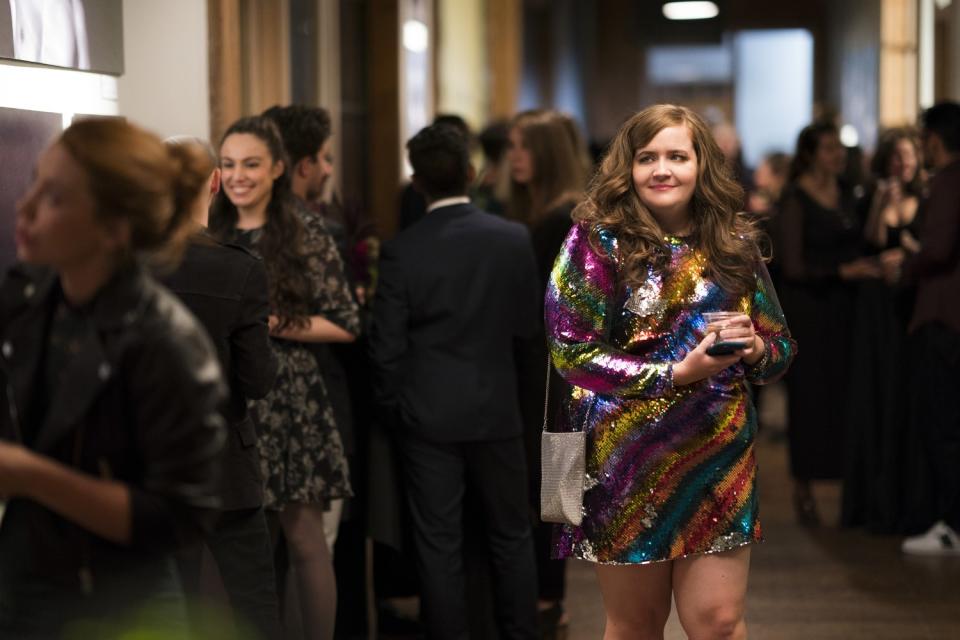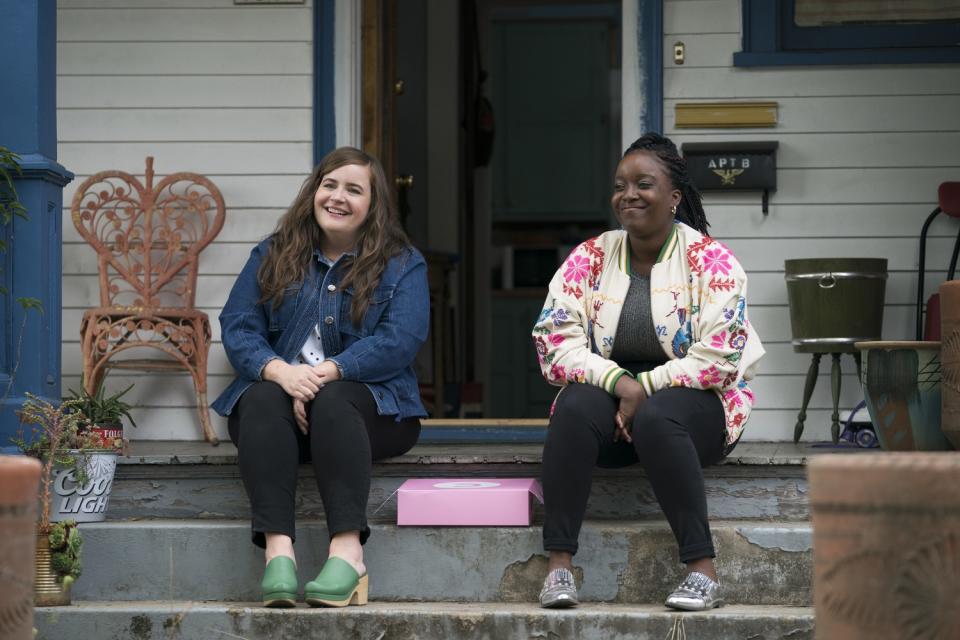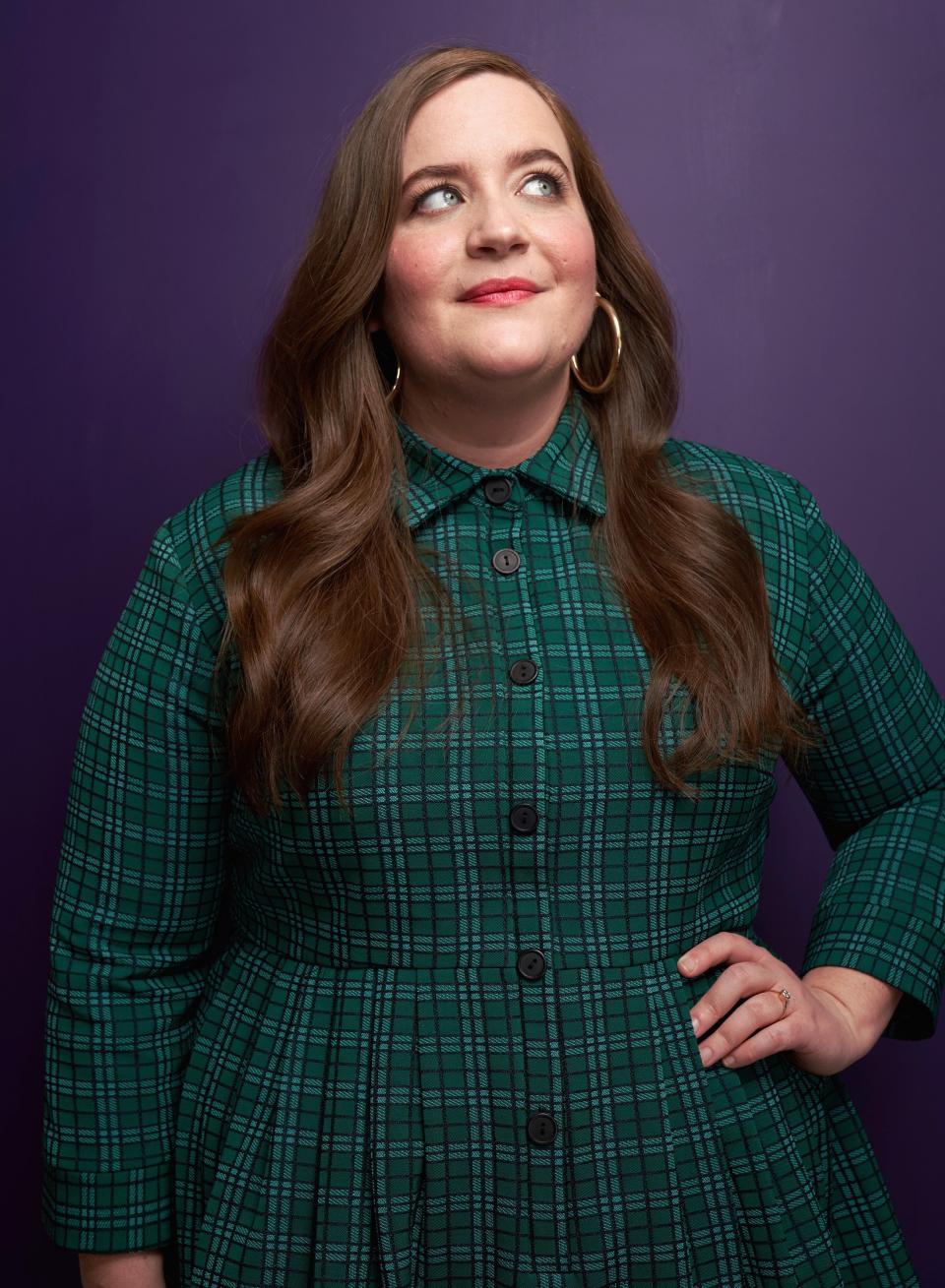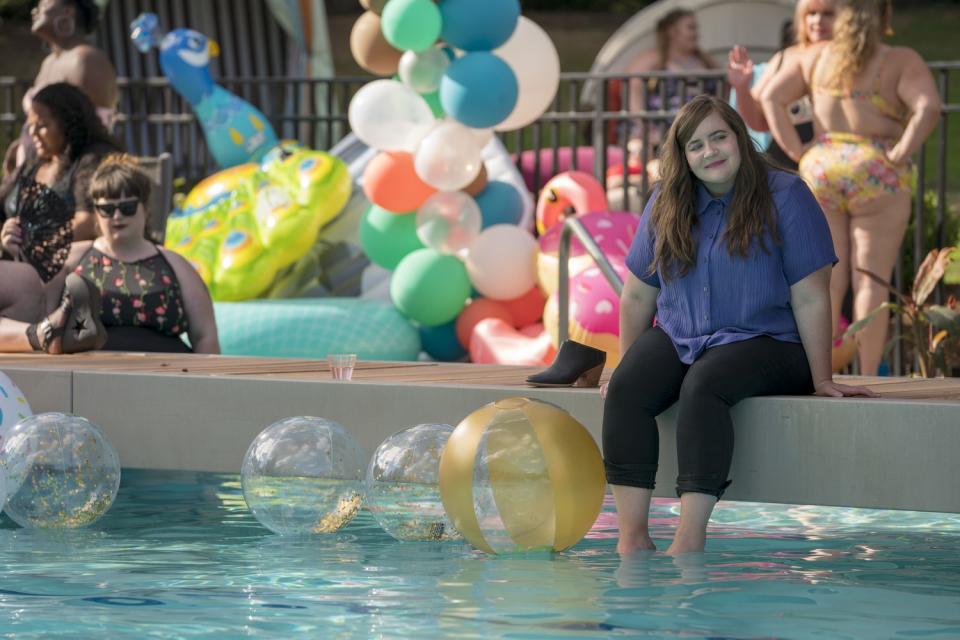Aidy Bryant Is Living Her Best Life
Aidy Bryant and I are at the Rainbow Room, a historic New York City landmark in the heart of Rockefeller Center, drinking ice water and staring at our menus like they're written in hieroglyphics. The clientele is straight out of Gossip Girl: sharp-looking men in expensive suits and women holding even more expensive handbags. One woman, Bryant points out, has a small dog perched on her lap. "This is the kind of New York lifestyle I can't handle," she says, laughing. "Today we're fancy business boys."
It's a joke that's funnier because Bryant has more than earned her seat in the Rainbow Room. You know her best as one of the regular cast members on Saturday Night Live, where she's impersonated Sarah Huckabee Sanders, Adele, and even Elton John. Now she's about to enter what she calls "fancy business" territory: starring in her own series, Shrill. Based on the best-selling book by Lindy West, the drama-comedy premieres on Hulu on March 15 and follows Annie, a self-proclaimed fat woman who's on a mission to love her body exactly as it is. In addition to appearing in all six episodes as the lead, Bryant is also credited as a writer and a producer. In short, she made this moment happen.
"I feel wholly changed by the entire experience," Bryant says about the series. "We made this thing top to bottom. It truly is my baby, and I'm incredibly proud of it." Being so heavily involved in all aspects of Shrill's production made Bryant realize how she likes to work. "As much as I enjoy occasionally popping in and doing a part in a friend's movie, I really like to write my own stuff," she says. "I like to be in there with it and make aesthetic choices. To find my own tone. I'm realizing, 'Oh, you've got to do it yourself if you want to have it a certain way.' And I like that."
Shrill's coproducer Ali Rushfield embraced Bryant's do-it-yourself approach. "She's a serious producer," Rushfield says. "She has a very definite point of view. I was surprised—and very into—just how much of a businesswoman she is."

Episode 103
Hulu
Episode 103
HuluThe result is a series that pushes plus-size representation forward. First and foremost, Annie isn't interested in losing weight. Though she's constantly bombarded with messages—from her mother, from her boss, from complete strangers—that her body is wrong, she doesn't feel that way. Yes, Annie wants to fix her life. She wants to write, her boyfriend sucks, her dad is sick. But her appearance has nothing to do with it.
"I don't know that this show has existed quite yet," Bryant says. "Especially as it goes on, it becomes less about her body and less about her size or that part of her identity. It becomes about her being a person, her relationships, her job, her family. There's something very thrilling about seeing a character who would typically just be the friend, be the lead of the show."
As Bryant points out, Annie's journey to body acceptance is gradual, and the beginning is rough: Her boss expresses faux concern for her "health" at a work function; a trainer calls her a "fat bitch" after she declines a workout; and she becomes the target of an online troll.
There's a consistent through line in all the times Annie is fat-shamed on Shrill: She isn't even thinking about her body when it happens. As a plus-size person myself, I identified with this. I don't spend 24 hours a day thinking about my weight; it's only when other people chime in, uninvited, that I'm reminded of it.


"We really wanted it to show how it actually feels to be a fat person," Bryant says. "You're just living your life, and then someone else reminds you that you're fat. Or you're with your friends and you all decide to get matching T-shirts, but there isn't one that fits you. Those moments where you're just trying to live, and some exterior force reminds you that you don't fit. That you're too big. And how that can just take the wind out of your sails."
Annie has an epiphany at a "Fat Babe Pool Party," where she sees women of all shapes, sizes, and colors enjoying themselves without a care in the world. It leads to one of the most poignant monologues in the show. "I've wasted so much time and energy and money…for what? For what?" Annie says to her roommate, Fran (Lolly Adefope), and a new friend they meet at the pool party. "I'm fat. I'm fucking fat. Hello? I'm fat!"
Bryant experienced a similar aha moment in her own life. "At a certain point, after all the dieting, weird exercise programs, or Weight Watchers—all these different things that I had tried—I didn't look any different," she says. "I didn't super care, but people were telling me that I was supposed to. So I was like, 'I'm going to wash my hands of this.' I just started trying to be healthy for myself and put all that energy into trying to achieve my dreams."
The pursuit of those dreams first took Bryant to Chicago, where she attended Columbia College and became a member of the famed Second City improv group (Tina Fey, Amy Poehler, and Stephen Colbert are also alumni). The change of scenery—Bryant grew up in Phoenix—did wonders for her, both personally and professionally.
"I went to a sporty high school with a lot of very thin, very athletic girls. I always felt like, I don't fit in, and I should, and that's what matters," she says. "Then I went to Chicago and met these girls who were big, like I was, and fashionable and had boyfriends. They didn't seem encumbered by their own thinking of themselves. I remember being like, Well, I want to be like them. That was a big game changer for me."
Not everyone in Chicago was enlightened, of course. Bryant says the first few talent agents she met had limited ideas about where her career could go. "They were basically like, 'Look, you know, there are not a lot of roles for your type,'" she says. "At the time, I think I was 21 or 22, they would send me out for mom parts in, like, Walmart commercials where it was like, 'This is a mom with three kids.' I think because of my body type, they were like, 'Oh, she's a mom,' which is wild."

Episode 104
HuluWild but, unfortunately, common. Though Bryant says her experiences on Saturday Night Live have been positive, she's still offered roles in movies that are problematic and demeaning. "I think the people sending it to me just haven't thought it through," she says. "They've written a character that's, like, no man will date her unless she has a special power or can trick them or gets a magic spell on her. They may not be thinking of it as, 'This is a role for a fat woman.' But if I take that role, I'm automatically representing fat women. It just puts a different context on their story."
On Shrill, Bryant represents fat women proudly. Annie is cool, full stop; she has great friends, a chic fashion sense, an active sex life. That last one was particularly crucial for Bryant to showcase. "Was I dying to do a sex scene? No," she says. "But it was extremely important to me to show. I wanted to do it for girls. I feel, a lot of times, it's represented as this jokey, 'A fat lady jumps on a man and rips off his clothes.' I wanted this to be humanized. It was important for me to show some dignity in that."
Dignity is the word that comes through when you're watching Shrill. The show is realistic, even the most mundane parts, like when Annie stretches out her clothes before putting them on. But Shrill does more than resonate: It shows fat people—fat women, in particular—the kind of love and support they're entitled to. Whether in romance or at work or someplace else entirely, Annie doesn't let other people's opinions stop her from living her best life. Fully and out loud. That's something so many people, myself included, need to see more.
"I've had a million moments where I didn't do something or didn't wear something or didn't go to something because I didn't want to have to show my body," Bryant says. "It doesn't fucking matter. If people think shit, who cares? Fuck ’em. I'm living my life. I think it's a nice way to be—and to me, it's a nice thing to put on TV."
Christopher Rosa is the entertainment staff writer at Glamour. Follow him on Twitter at @chrisrosa92.

